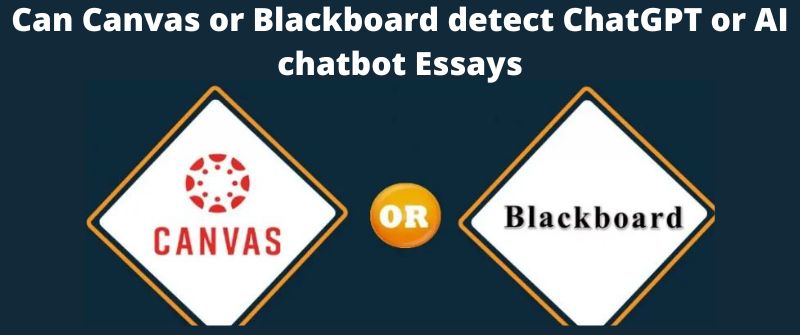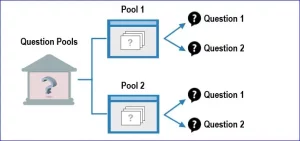Can SafeAssign and Blackboard detect ChatGPT or AI chatbot Essays

Blackboard is one of the best Learning Management Systems (LMS) used by schools today. An LMS is a software application that enables the creation, delivery, management, and tracking of online learning experiences.
An LMS provides a platform for educational institutions, businesses, and other organizations to deliver courses and training programs to learners, either online or in a blended learning format that combines online and in-person instruction.
Can Blackboard detect ChatGPT?
Blackboard is a web-based learning management system (LMS) that provides a platform for instructors to create and manage course content, assessments, and communications with students.
It is used by many educational institutions, including K-12 schools, colleges, and universities, to support online and blended learning.
Blackboard cannot detect ChatGPTbecause it is not specifically designed to detect the use of AI, language models, or AI chatbots like ChatGPT. This is because Blackboard is only a learning management system that provides an online platform for instructors to manage course content, assessments, and communications.
However, Blackboard has various features that can help to prevent cheating and uphold academic integrity, such as:
1. Randomized question pools

Blackboard allows instructors to create question pools, where questions are randomly selected for each student, preventing the sharing of answers between students.
2. Time limits
Blackboard allows instructors to set time limits on assessments, preventing students from taking too much time to complete an assessment or giving them enough time to use external resources to look up answers.
3. LockDown Browser
Blackboard offers LockDown Browser, which is a custom browser that prevents students from opening other applications, browsing the internet, or taking screenshots while taking an exam.
4. Plagiarism detection
Blackboard integrates with third-party plagiarism detection called SafeAssign, which can help to detect instances of plagiarism in student files. This way, Blackboard effectively detects copy-pasting and all forms of plagiarism.
While Blackboard is not specifically designed to detect the use of ChatGPT, instructors can use the above features to create assessments that test critical thinking and problem-solving skills and prevent cheating.
In addition, instructors can provide clear guidelines and expectations for academic integrity and educate students on the value of learning and honest effort.
Other better Features of Blackboard
Blackboard offers a variety of features that can be used to deliver educational content, such as online course materials, assignments, tests, and discussion forums.
It also provides tools for collaboration, communication, and assessment, including grade books, attendance tracking, and student performance analytics. Blackboard is designed to be intuitive and easy to use for both instructors and students, with a range of customization options to suit the specific needs of each course.
In addition to its core features, Blackboard also integrates with many third-party tools and applications, including plagiarism detection tools, video conferencing software, and external content repositories.
This allows instructors to incorporate a wide range of resources and technologies into their courses, while maintaining a centralized hub for course management and communication.
While it cannot detect the use of AI to cheat, Blackboard is a powerful and flexible tool for delivering and managing online and blended learning, providing instructors and students with the tools they need to succeed in the digital age.
Can SafeAssign detect ChatGPT?
SafeAssign is a plagiarism detection tool used by many educational institutions to check student work for unoriginal content. SafeAssign compares submitted papers to a variety of sources, including academic journals, websites, and other student papers, to identify any matching text and provide a similarity score.
SafeAssign cannot detect ChatGPT or AI content because it is designed to detect similarity and plagiarism. As an AI language model, ChatGPT generates text through machine learning algorithms, and it is not typically included in the sources that SafeAssign checks. Therefore, it is unlikely that SafeAssign would detect ChatGPT as a source of unoriginal content.
However, it is important to note that using an AI language model like ChatGPT to generate text for academic assignments may still be considered academic misconduct, depending on the specific guidelines and policies of the educational institution.
It is always best to check with your instructor or academic institution to understand their policies and expectations regarding the use of AI-generated content in academic assignments.
Why BlackBoard and SafeAssign cannot detect AI
A language model is an artificial intelligence (AI) model that has been trained on a large corpus of text data to generate natural language text.
Essentially, a language model is a program that learns how words, phrases, and sentences are used in context, and then uses that knowledge to predict the likelihood of future text.
Language models are used in a wide range of applications, such as natural language processing, speech recognition, text-to-speech synthesis, and chatbots.
They work by using statistical techniques to analyze patterns in language use, and then use those patterns to predict the next word or phrase in a sentence.
There are several types of language models, including n-gram models, recurrent neural networks (RNNs), and transformers.
N-gram models use simple statistical techniques to generate text based on the frequency of word sequences in the training data. RNNs are more complex and use a neural network architecture that can capture long-term dependencies in the data.
Transformers are a type of neural network architecture that has become increasingly popular in recent years, particularly for tasks like language generation, translation, and summarization.
Overall, language models are an important tool for natural language processing and are increasingly being used in a wide range of applications.
How Schools can use AI to prevent Cheating
Schools already have ways to prevent cheating. However, good can be made better. Schools can use AI to prevent cheating in various ways, such as:
1. AI-based proctoring
Schools can use AI-based proctoring tools to monitor students during online exams. These tools use machine learning algorithms to detect suspicious behavior, such as looking away from the screen, opening unauthorized applications, or receiving help from others.
For example, proctor systems effectively enable BLackboard to detect cheating by monitoring students’ behavior while taking tests.
Also, AI-based proctoring can help to prevent students from cheating during exams, and can provide instructors with evidence of potential academic dishonesty that can be used in investigations.
2. Plagiarism detection
Schools can use AI-based plagiarism detection tools to check for instances of academic dishonesty in written assignments.

These tools use natural language processing algorithms to compare student work to a database of existing sources, looking for matches in text and phrasing.
AI-based plagiarism detection can help to prevent students from submitting work that they did not write themselves, and can provide instructors with evidence of potential academic dishonesty.
3. AI-assisted grading
Schools can use AI-assisted grading tools to speed up the grading process and ensure consistency across multiple graders.
These tools use natural language processing algorithms to analyze student work and assign grades based on a pre-determined rubric.
AI-assisted grading can help to prevent grading biases and errors, and can free up time for instructors to focus on other aspects of teaching and learning.
4. Chatbot-based support
Schools can use AI chatbots to provide students with support and guidance on academic and administrative matters. These chatbots can answer frequently asked questions, provide guidance on coursework and assignments, and help students navigate administrative processes.
By providing students with easy access to information and support, schools can reduce the likelihood that students will resort to cheating to get ahead.
By using AI tools to prevent cheating, schools can ensure that academic integrity is upheld and that students are evaluated fairly and accurately.
However, it’s important to note that AI tools are not foolproof, and that they should be used in conjunction with other measures, such as education on academic integrity and the design of assignments and exams that test critical thinking and problem-solving skills.

